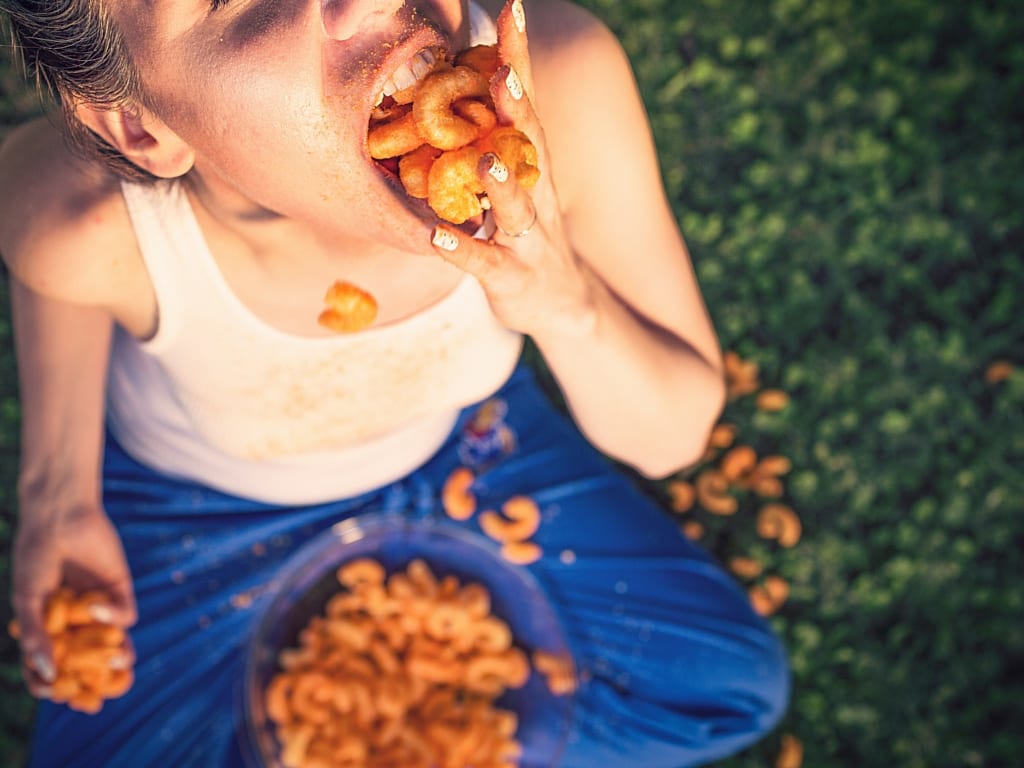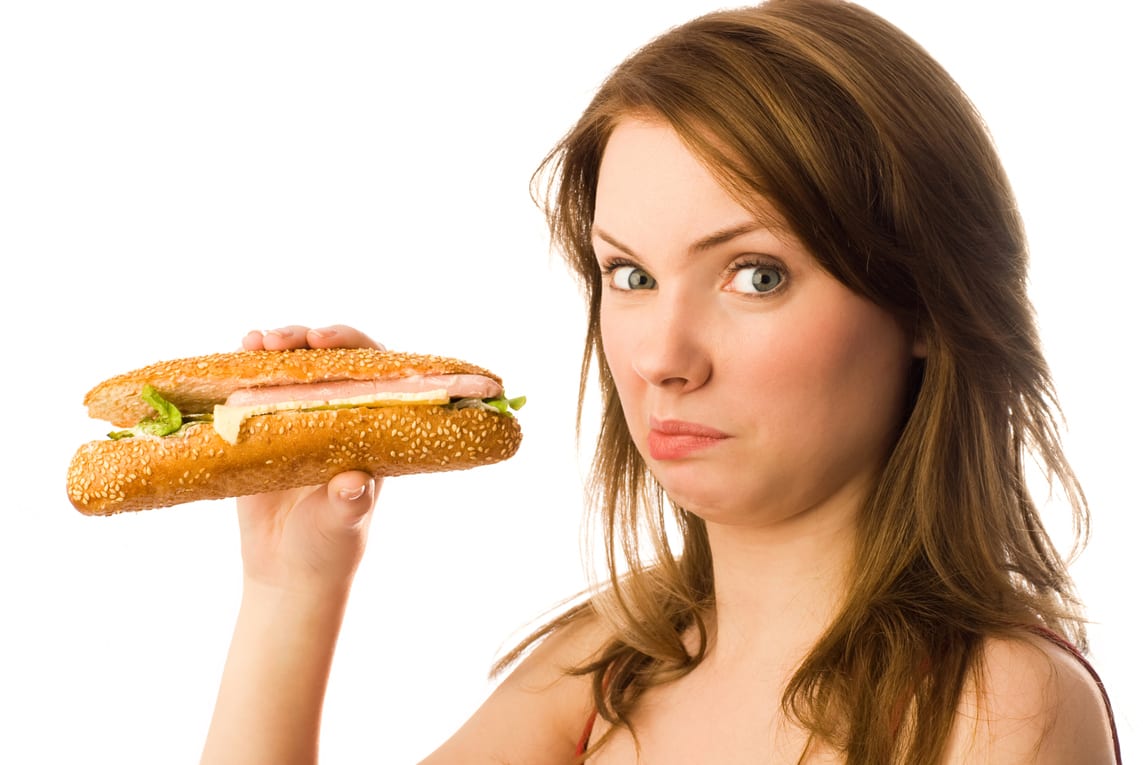
Eating disorders are the order of the day. We live in an image-obsessed society, able to go to extremes in order to have a good appearance. The problem begins when, because you like others, you forget something as proper and necessary as personal health.
We parents worry from the earliest childhood about the feeding of our children. We want them to eat well; good quantities and very varied. But as they grow up and go from being children to adolescents, their mentality changes, and with it they can change the eating habits that we have worked so hard with them. That is why it is important that we are aware of the variations that we can see around the behavior of our adolescent children with food.
Major disorders
Bulimia
Suffered more by women than by men, this disorder leads the person who suffers to eat "large" amounts of food. This generates a feeling of guilt that causes you to vomit to get rid of food, which they fear because of their fear of getting fat. It is often accompanied by another eating disorder known as anorexia.
Clues
One of the most important things, and one that would save us time, is to listen to our children. Interrogations don't work with teens; let them speak and express themselves so that they gain the confidence to talk about their problem.
Bulimia is such a well-kept secret that until the person suffers damage, such as dehydration or anemia from continued vomiting, there is not the slightest suspicion. Even until he's caught vomiting, we don't even notice. Something that this disorder has in common in all people:
- Hide food.
- Avoid eating accompanied.
- Drink a lot of water between bites.
- Go to the bathroom at the end of the meal.
- Tomar laxatives.
- Fast total or partial.
- Excessive physical exercise.
- Anxiety y depression.

If we suspect that our children may be going through something like this, we must speak calmly to them. Do not fall victim to their problem as they will feel quite bad emotionally. Offer professional help and try to avoid being left alone after meals. A well-nourished body and mind will function better and will see things more clearly.
Anorexia
Not all anorexics are bulimic, and not all bulimics are anorexic. Anorexia also does not occur only in people who are underweight for their height and bulk. Many people with anorexia are of normal weight (which will gradually decrease due to prolonged fasting).
With this disorder the obsession with thinness is extreme. This is what makes them sick. In our current society it is an increasingly widespread disease among adults, and not only women, more and more men are suffering from it. Low self-esteem, unrealistic beauty standards and the stress of an idealized life can be factors that increase the possibility of suffering from anorexia nervosa..
Many adolescents who suffer from it suffer from very severe depression but they hide behind false appearances. People who suffer from anorexia make an effort to hide their disorder since the fear of gaining weight if they recover is greater than the interest in their own health.
Clues
- Extreme thinness (Not all underweight people suffer from anorexia).
- Unreal picture about oneself. Looking fat despite being at or under his weight.
- Fear of gaining weight.
- Obsession with calories and for the food in general.
- Doing high intensity exercise.
- Pill consumption diuretic, laxative or slimming.
- Amenorrhea in young women.
- Fast.
- Depression and sadness.
In most cases, anorexia is accompanied by bulimia. The feeling of guilt and fear prevent them from being able to retain the food they have eaten in their body. If you suspect that your child is suffering from anorexia nervosa, as with bulimia, you should speak with him or her about it. Try not to make him feel guilty with your words; they are suffering more than you with this.

If the disorder is very much in the mind, the ideal would be go to some type of therapy. Most of the centers specialized in eating disorders are private and in many hospitals they still mix people with eating disorders with others who have other types of mental disorders, so if you need to go to one of these centers, inform yourself well before anything else. .
This disorder it is not cured by making the person fat; You have to dig deep to heal your self-esteem and get you out of that deep depression that has led you to self-destruct.
Binge eating disorder
This eating disorder is based on the excessive consumption of food a couple of times a week but without causing vomiting as in the case of bulimia. People who binge are, in most cases, obese or overweight people who fail in their diets. They suffer from a lot of anxiety and that is what leads them to fail in their diets and to eat compulsively.
Diets should not be a rule for weight loss. The most important thing to lose weight is to follow correct eating habits. Teenagers who binge often relapse into stressful times in school, although also a bad family environment or a depression with periods of anxiety can make them binge.

Clues
- Eat alone.
- Doing the main meals normally and then binge.
- Hide food at home.
- Feeling more anxiety after eating from the feeling of guilt and shame.
- Eating food until you feel sick.
- Eat without hunger.
Eat your fill, even if it's on time, can have serious consequences at the digestive level. At times of binge eating, the stomach is under high pressure from the large amounts of food that are being deposited in it. Despite having a large capacity, its walls can be damaged which can lead to ulcers, peritonitis and finally death.
Although it seems like a mild eating disorder because there is no vomiting or fasting and the person is not hungry because they are also overweight, it is a disorder that must be treated and controlled. Anxiety should be treated from the root with natural remedies or professional treatment.

If you suspect that your child may be binge-eating, the first thing to do is do not offend him about his weight gain. In some provinces there are therapies for compulsive eaters. Your child can keep track of when he relapsed, noting what he was feeling at that moment and what thought led him to binge.
Binge eating can originate in childhood. Giving food as a reward is one of the things that makes us associate food with something pleasant, so we will go to it when we feel worst. Advertising on television He also plays with false happiness hidden in the form of sweets.
Other eating disorders
Vigorexia
Obsession for having a muscular body. This disorder is accompanied by a strict diet and an unreal image of the sufferer with himself. They are people who look weak and puny despite having a muscular physique.
Orthorexia
The person who suffers from it has obsession with eating healthy and having a good diet, avoiding in your diet fats and foods that contain proteins and vitamins necessary for the body.
Perarexia
Obsession with calories in food. They think that everything ingested, even water, makes you fat.

Pike
It is a more common disorder than is believed in which substances without any nutritional value are eaten (or inedible) such as chalk, ash, sand ...
Potomania
Obsessive disorder with the amount of water you drink per day. It is a dangerous disorder because it can alter the mineral values in the body. People who suffer from it can consume about 4 liters of water a day, which helps them feel full and not eat. Accompanied in many cases by anorexia nervosa.
sadorexia
Extreme eating disorder where the person who suffers from anorexia and bulimia also suffers episodes of corporal abuse due to the erroneous thought that going through pain loses weight. It is better known as the pain diet disorder.

Night Eater Syndrome
Accompanied by periods of insomnia, with this disorder, a large part of the calories required during the day are consumed at night. It can lead to being overweight and in more extreme cases, obesity.
drunkorexia
Disorder that appears in people who consume alcohol and cut out main meals to make up for calories in beverages they drink. Is giving especially in teenagers who go out on weekends and consume alcoholic beverages.
pregorexia
Eating disorder in pregnancy, similar to bulimia, in which pregnant women are afraid of gaining weight and therefore make extreme diets or vomit.
If it is confirmed that your child is suffering from some type of eating disorder, consult your trusted doctor. Be careful with internet accesses; Unfortunately there are pro-anorexia and pro-bulimia pages that can motivate them to continue with their illness.
